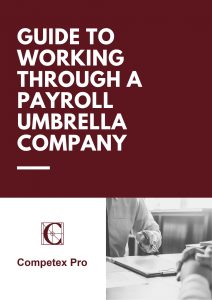Terms and Conditions of Employment
Competex Pro
Contract of employment
When you work via Competex Pro, you become an employee of the company and not a director or shareholder, unlike when working through your own limited company (PSC). You will receive your income as salary (plus expenses if applicable) and not as dividend.
Your contract of employment is with Competex Pro and not with the end-client or agency. The terms of your contract of employment are largely in line with the terms of any other contract of employment (e.g. disciplinary, health and safety etc) but with certain differences to take account of the unusual circumstances of employment by Competex Pro as a payroll umbrella company.
When working through Competex Pro, you work under an ‘overarching’ contract of employment, which is worded to provide continuous employment covering multiple assignments for different end-clients at different temporary locations, so that you may claim certain travel and subsistence expenses.
As a matter of good practice you are expected to work on the assignment until the assignment is ended and to complete it to the end-client’s satisfaction. To do otherwise would jeopardise your own reputation.
Identity
Compliance
Termination of assignments in the case of non-payment by the agency or end-client
Competex Pro reserves the right to terminate an assignment with immediate effect if the agency or end-client fails to pay an invoice within 14 days of submission.
In such a case you should not provide any further services until the agency or client satisfies us that they will, in future, meet their obligations for payment.
Overarching contracts of employment – an explanation
The key issue is that if your contract of employment with Competex Pro were to relate to only a single assignment, the end-client workplace would automatically become your permanent place of work, and we would then not be permitted to claim travel expenses from the agency or end-client on your behalf.
In principle, HMRC permits travel expenses to be claimed only if you are travelling to and from a temporary place of work. However, as a contractor, you would normally work on different assignments in different locations for a limited duration in each case.
To overcome this issue, your contract of employment is worded to provide continuous employment covering multiple assignments, each carried out with different clients at temporary places of work. This form of contract has become known as an ‘overarching’ contract.
HMRC define a temporary place of work as follows: “A workplace is a temporary workplace if an employee goes there only to perform a task of limited duration or for a temporary purpose. Therefore, even where an employee attends a workplace regularly, it will be a temporary workplace and so not a permanent workplace, if the employee attends for the purpose of performing a task of limited duration or other temporary purpose.”
Expense claims for travel are also subject to the ’24 month rule’, which stops a workplace from being a temporary workplace when an employee attends it in the course of a period of continuous work that lasts, or is likely to last, more than 24 months. For this reason you cannot be paid travel expenses once it becomes evident that an assignment will continue beyond 24 months duration.


